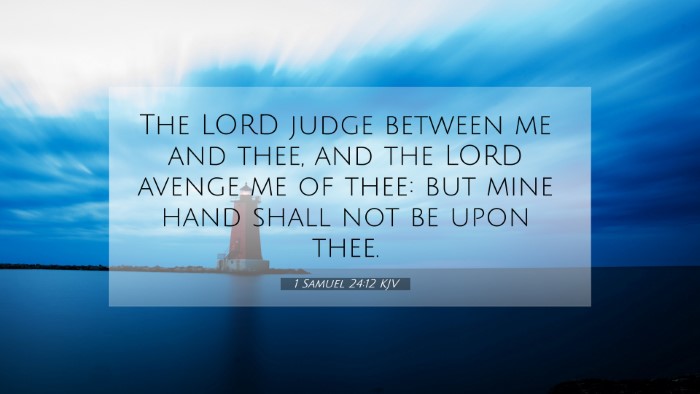Understanding 1 Samuel 24:12
The verse 1 Samuel 24:12 states:
"The Lord judge between me and you, and the Lord avenge me of you: but mine hand shall not be upon you."
This verse captures a profound moment in David's life, reflecting his faith, integrity, and the moral choices he made amidst difficult circumstances.
Verse Meaning and Context
In context, this verse occurs when David spares King Saul's life in a cave. Though Saul sought to kill David, David did not retaliate, illustrating a superior moral character. Commentators such as Matthew Henry, Albert Barnes, and Adam Clarke offer valuable insights into this passage.
-
Matthew Henry emphasizes the importance of trusting in God's justice rather than taking matters into one's own hands. David's declaration speaks to the notion of divine judgment.
-
Albert Barnes highlights the idea of David’s restraint, showing that while he had the opportunity to harm Saul, he chose mercy; portraying a leader who respects God's anointed.
-
Adam Clarke points out the prophetic nature of David's words, suggesting that his claim to leave vengeance to God reinforces a spiritual principle applicable in any believer's life.
Thematic Connections
David's words in this verse resonate with several key themes found throughout the Scriptures, such as mercy, divine judgment, and the pursuit of righteousness.
The themes derived from this verse can find connections in the following Bible verses:
- Romans 12:19: "Dearly beloved, avenge not yourselves, but rather give place unto wrath: for it is written, Vengeance is mine; I will repay, saith the Lord."
- Psalms 37:5-6: "Commit thy way unto the Lord; trust also in him; and he shall bring it to pass."
- Matthew 5:39: "But I say unto you, That ye resist not evil: but whosoever shall smite thee on thy right cheek, turn to him the other also."
- Proverbs 20:22: "Say not thou, I will recompense evil; but wait on the Lord, and he shall save thee."
- Hebrews 10:30: "For we know him that hath said, Vengeance belongeth unto me, I will recompense, saith the Lord."
- 1 Peter 2:23: "Who, when he was reviled, reviled not again; when he suffered, he threatened not; but committed himself to him that judgeth righteously."
- Luke 6:27-28: "But I say unto you which hear, Love your enemies, do good to them which hate you."
Cross-Referencing Biblical Texts
This verse serves as a remarkable example of how to engage in Bible verse cross-references. The connections illustrate that the understanding of God's justice and mercy is a theme ingrained deeply in the Christian canon. Exploring these impacts how one can see the internal consistency and unfolding narrative of the Bible.
Tools for Bible Cross-Referencing
To further enhance your understanding of this verse and its connections, consider utilizing various resources such as a:
- Bible Concordance: A tool that helps locate verses based on specific words.
- Bible Cross-Reference Guide: A structured resource to find related passages.
- Comprehensive Bible Cross-Reference Materials: Bible commentaries and study guides that discuss thematic parallels.
- Bible Reference Resources: Online or physical libraries containing extensive biblical texts.
Applying the Lesson
The moral choice David made in 1 Samuel 24:12 provides an enduring lesson for believers today. It challenges us to respond with grace and patience when wronged, pointing toward the necessity of trusting in God’s ultimate authority. In personal application:
- Reflect on situations where you may be tempted to seek revenge instead of seeking peace.
- Consider the importance of mercy and forgiveness in building healthy relationships.
- Engage regularly in cross-referencing Bible study methods to deepen your understanding of scripture.
Conclusion
In conclusion, 1 Samuel 24:12 offers rich insights not only into David's character but also into the broader biblical principles concerning justice and mercy. By exploring this verse through thematic Bible verse connections and cross-referencing Biblical texts, readers can enhance their spiritual understanding and apply these lessons in their lives.















